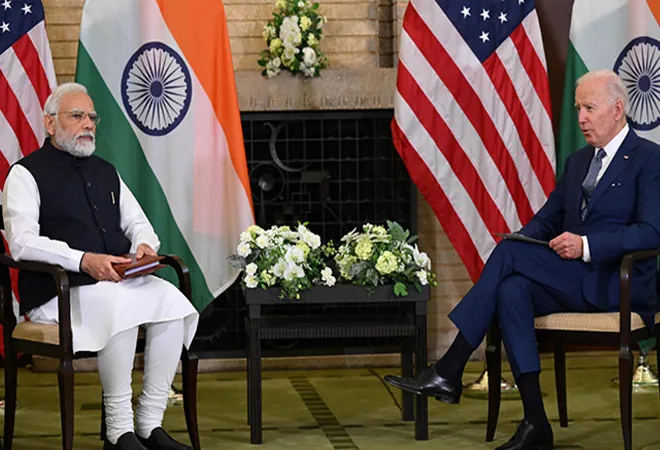-
CENTRES
Progammes & Centres
Location
As countries reconfigure value chains to lower critical dependencies, the deals inked at the India-US meeting strengthen bilateral and multilateral cooperation

Indian Prime Minister, Narendra Modi, recently met with United States (US) President, Joe Biden, in Washington. The meeting, marked with pomp and frenzy, resulted in substantial deals across various sectors. Among these, three developments could positively affect bilateral trade and further India’s trade imperatives: i). The termination of outstanding disputes at the World Trade Organization (WTO); ii). India joining the Minerals Security Partnership (MSP); iii). investments in India by US chip makers.
The meeting, marked with pomp and frenzy, resulted in substantial deals across various sectors.
First, on the multilateral front, the meeting resulted in both sides terminating six outstanding disputes at the WTO. Three of the above disputes had been initiated by India, and three by the US. The termination of these disputes is a significant step in enhancing bilateral trade and cooperation as some of the cases remained unresolved since 2012. In some disputes, both countries had imposed additional duties on products entering their respective markets to offset alleged trade distortions. Removing these additional duties will further boost bilateral trade because of lower costs.
Both countries agreed to terminate the following disputes:
Further, the good faith negotiations and mutual resolution of disputes reflect positively on the countries’ intentions to amicably resolve disputes in the absence of the WTO’s Appellate Body.
The good faith negotiations and mutual resolution of disputes reflect positively on the countries’ intentions to amicably resolve disputes in the absence of the WTO’s Appellate Body.
Second, during the bilateral meeting, it was declared that India will join the Minerals Security Partnership (MSP)—a “partnership aimed at securing the supply of critical minerals, which are essential for clean energy and other technologies, as global demand for them rises”. The goal of the MSP is “to ensure that critical minerals are produced, processed, and recycled in a manner that supports the ability of countries to realize the full economic development benefit of their geological endowments”. These critical minerals are used in green technologies for harnessing clean energy, and in high-end electronics. For India, the Economic Survey 2022-23 had pointed out that India needs “a multi-dimensional mineral policy to address the issues posed by the uneven distribution of rare earth elements”. Secure access to critical minerals is vital to fuel India’s green transition. India has set the ambitious goal of achieving net-zero emissions by 2070, and stated that it will meet 50 percent of its electricity requirements from renewable energy sources by 2030. India also recently released a list of critical minerals “in a bid to reduce import dependencies, enhance supply chain resilience, and support the country's net-zero objectives”. India’s membership of the MSP will create robust and diversified supply chains for securing access to critical minerals and is in line with India’s overall objectives of shifting to clean energy sources. Membership of the MSP is also vital in realising India’s goals of becoming a manufacturing hub for semiconductors that require critical minerals. The MSP currently consists of fourteen members including Australia, Canada, Finland, France, Germany, Italy, Japan, South Korea, Sweden, Norway, the United Kingdom (UK), the US, the European Union (EU), and now India.
Third, investments in India by US memory chip maker Micron Technology and by semiconductor toolmaker Applied Materials will further integrate India in the value chain of chip manufacturing. While Applied Electronics’ investment will be towards establishing a new engineering centre in India that is likely “to support more than US $2 billion of planned investments and create 500 new advanced engineering jobs”, Micron will set up an assembly, testing and packaging plant in India. The investment by Micron is crucial as it will put India on the global map of the semiconductor supply chain. At the new facility, Micron “will enable assembly and test manufacturing for both DRAM and NAND products”. Samsung, SK Hynix, and Micron, are some of the largest manufacturers of both DRAM and NAND chips. These chips are used in everyday appliances and electronics, including smartphones, PCs, and servers. The new facility in India is expected to address the demand for these chips from domestic and international markets. In addition to integration in the semiconductor supply chain, the new plant by Micron is expected to have a positive spillover effect on the Indian electronics industry by localising component manufacturing.
In addition to integration in the semiconductor supply chain, the new plant by Micron is expected to have a positive spillover effect on the Indian electronics industry by localising component manufacturing.
Countries have been increasingly investing in and subsidising chip manufacturing domestically to ease dependencies and de-risk the value chain from supply shocks. Referred to as “the bedrock of our modern economies” by European Commission President Ursula von der Leyen, chips play a pivotal role in modern technology and permeate all aspects of everyday life. India’s goal is to achieve self-reliance in semiconductor manufacturing and build domestic capacity. India’s demand for semiconductors is also expected to grow in the coming years, including critical sectors such as space and defence. Considering this, India has sought to reduce dependencies by building its manufacturing capacity. Establishing an assembly, testing, and packaging plant is, therefore, the first step in creating a chips ecosystem in India. Further, the investments by chip makers also speak to India’s credentials as a reliable partner in a critical sector.
As countries reconfigure value chains to lower critical dependencies, form new alliances, and adopt ‘friend-shoring’ policies, the deals inked at the India-US meeting strengthen bilateral and multilateral cooperation. Three of the abovementioned deals will not only enhance bilateral trade, but also create robust supply chains for the future and strengthen India’s place in global value chains. In addition to contributing to India’s manufacturing capacities, creating jobs, and increasing knowledge sharing between the two countries, the deals are also reflective of India’s credentials as a reliable partner in critical sectors.
Urvi Tembey is an Associate Fellow- International Law, Trade, and Multilateral Organizations at Observer Research Foundation.
The views expressed above belong to the author(s). ORF research and analyses now available on Telegram! Click here to access our curated content — blogs, longforms and interviews.

Urvi Tembey worked for ORF was an Associate Fellow in the areas of international law, trade, and multilateral organizations. ...
Read More +